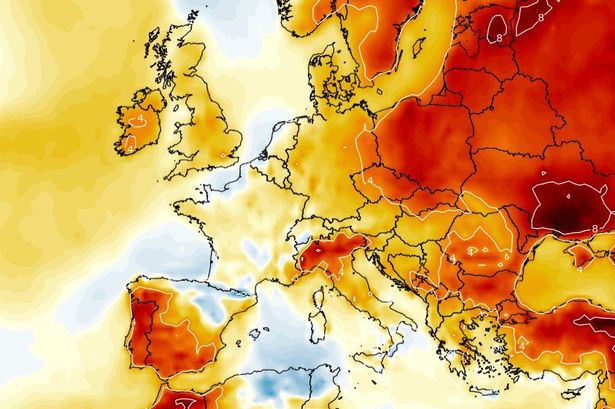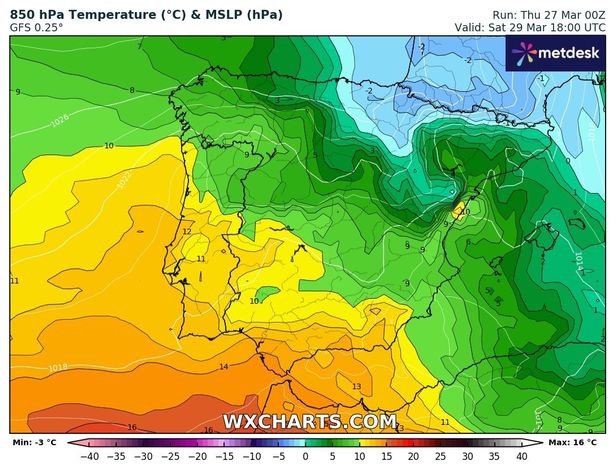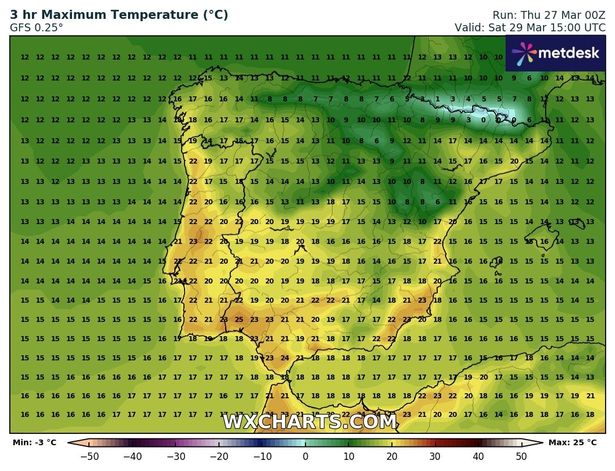Storm Martinho caused an unexpected weather event in southern Spain earlier this week, but hail is turning to heat as temperatures are expected to skyrocket this weekend
New forecast maps reveal that Spain is going to be hit with sky-high temperatures only days following a freak winter storm. Malaga, a popular Spanish holiday destination, was covered in a blanket of hail after a spell of unexpected weather earlier this week.
The picturesque town of Alhaurin el Grande was cast completely in white as sleet and hail covered roads and houses. As a result of the surprise onslaught of snow, the state weather agency, Aemet, placed the entirety of the Costa del Sol on emergency yellow alert, alongside Ronda, Cadiz and the Huelva coast. The Costa del Sol was included in the emergency alert—which ended late on March 25—due to intense, localised rainfall. The unexpected showers are believed to be a remnant of Storm Martinho.
Storm Martinho had already significantly damaged much of Spain prior to the hail showers in Malaga, including large swathes of the southern coast of Spain where an ancient Roman bridge was destroyed in the process.
READ MORE: Brits trapped inside as Spanish resorts suffer record washout and hail storms
Spain’s heating up
While this has been one of the wettest Marches on record for Spain, the tides seem to be turning from hail to heat. The weekend of March 28 to March 30 is expected to bring summer-like temperatures to the south of Spain. According to Aemet, temperatures in Seville and Murcia are expected to exceed 25°C. Similarly, Marbella and Malaga will reach temperatures as high as 26°C.
Other areas in southern Spain will enjoy slightly lower maximum temperature, closer to 22°C and 24°C respectively. The Canary Islands will also enjoy less oppressive temps, with Tenerife and Gran Canaria reaching 23°C . Other parts of the country will not experience the same heat. In fact, in the extreme north of Spain the weather is expected to remain cloudy and damp over the weekend. Strong wings from the northwest will also place popular destinations like Valencia and Catalonia on yellow alert.
‘Heat islands’ have become a growing concern in Spain in recent years. A recent report from the University of Murcia found that a significant loss of trees and shaded spaces in urban areas across Murcia are intensifying heat in urban areas, particularly in the capital. Essentially, the lack of green spaces and climate changes are creating a rise of urban heat islands (UHIs).
The significant temperature fluctuations and rise of heat islands is a huge threat to both locals and tourists. Especially considering Spain suffered one of its most devastatingly hot summers not too long ago.
According to the Barcelona Institute of Global Health (ISGlobal), Spain has the second-highest number of heat-related moralities in all of Europe in 2023—second only to Italy. Climate Central reported that over 8,000 deaths were caused by heat.
Women and older adults are more at risk of heat-related death. That is because these deaths are often caused by illness triggered or exacerbated by the extreme heat, including hypertensive pathologies, renal failure and metabolic disorders.


